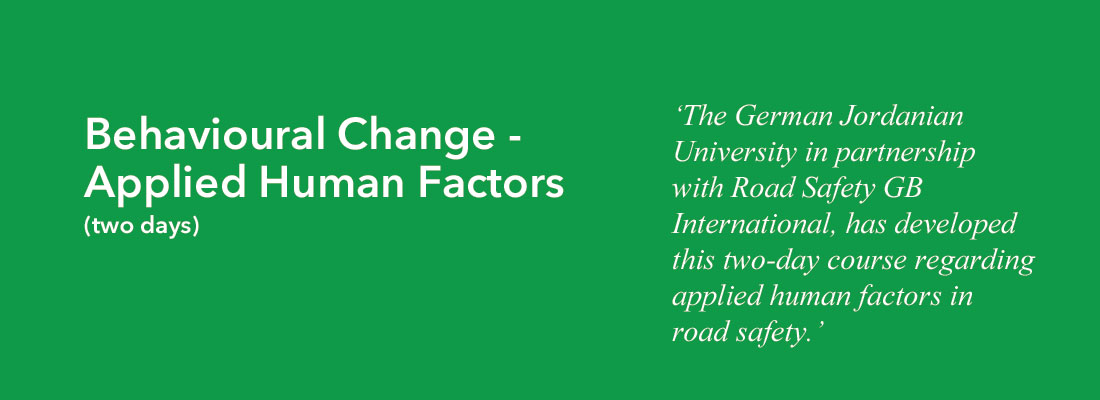
The German Jordanian University (GJU), in partnership with Road Safety GB International, has developed this two-day course regarding applied human factors in road safety.
The course is delivered at GJU in Amman by highly qualified and experienced tutors from the Road Safety GB Academy.
Who should attend?
This course is essential learning for students undertaking civil highway engineering, urban planning training and other related education and training courses that will involve the improvement of road safety. It will provide them with a wider understanding of the relationship between the built environment and the ‘road user’, enabling them to explore, design and implement infrastructure that will take into account the limitations of the ‘human’ in the system.
Human factors (Behavioural Change) courses, very similar to this course, are delivered across the UK and are very popular. Student places are taken very quickly so it is advisable to book as early as possible as each course is limited to 20 students.
Course description
The course has been developed for the GJU to introduce students to human factors, and how the work that the students will do in future may impact both positively and negatively on road user behaviour.
The course has the following four main elements;
- Understanding Behaviour
- The Safe Systems Approach to Road Safety
- Partnership Working
- Evaluation
Understanding Behaviour
The course develops the student’s understanding of how and why we make decisions and how that may influence our behaviour, including:
- What informs road user behaviour
- Analysing behaviour
- Psychological concepts that explain behaviour
Learning outcomes
This element of the course will increase the student’s understanding of how culture, personality, context, fitness, training and personal experience impacts on road users’ behaviour. It will develop the student’s ability to analyse and identify possible solutions. The student will also gain an understanding of a number of psychological concepts including norms, attitudes, behavioural control, self-identify, emotions and intentions, and willingness.
Safe Systems Approach (learning outcomes)
This element of the course will develop the student’s understanding of the main concepts relating to a safe systems approach to road safety in relation to:
- Historical development of the concept
- Allowing for human error
- The four main constructors contained in the model:
- Speed
- Infrastructure
- Vehicles
- User
- Investigation of a number of applications of the safe systems approach.
Partnership working
The third element of the course will enable students to identify and consider the three key elements of partnership working in road safety:
- Enforcement
- Engineering
- Education
Learning outcomes
To develop the student’s understanding of the steps they need to consider when planning a road safety intervention, and to identify partners in the wider field.
Evaluation
The final element of the course discusses the development and implementation of evaluation in road safety interventions.
Learning outcomes
To develop the student’s understanding of the role of evaluation and how it can be used effectively, including:
- Qualitative and quantitative approaches
- Evaluation design
- Identification, design and use of appropriate measures.
Learning will be assessed by completion of an assessment task, to be returned within 4-weeks of course completion.
Dates and venue
There are no current dates/venues for this course.
More information
For more information about the course content please contact Ian Edwards by email.




